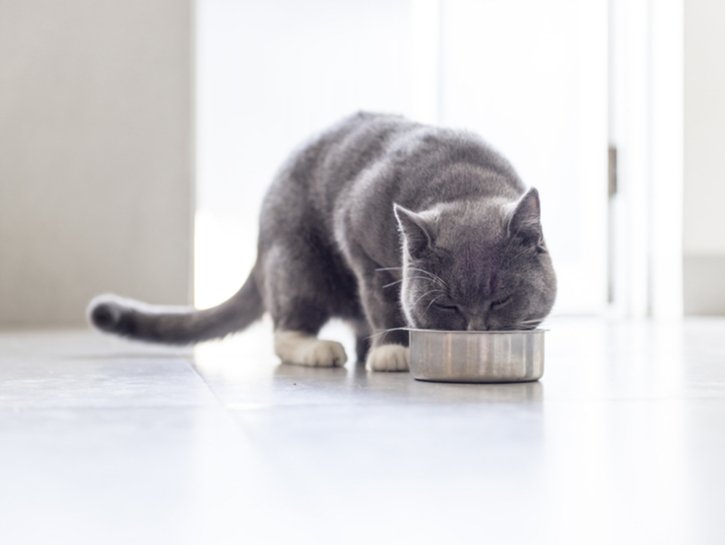Dog’s aren’t the only pets that can beg for food under the dinner table. Cats can be just as bothersome, if not more so, when it comes to pursuing your food (and if your cat is anything like mine, they’re not afraid to bat your snacks out of your hands to eat themself). But not all human food is safe for cats to eat. Here are some foods that are safe and tasty for your feline:
Meat

correct pictures/Shutterstock
Cats are carnivores, which means beef, chicken, pork, turkey and fish are a tasty treat your cat will love to chow down on. Cats’ diets must be animal-based and high in protein in order for them to remain healthy, and they can also digest raw meat better than humans because their bodies are more equipped to handle pathogens that might make us sick. So if your cat is begging for a bite of your salmon, it won’t hurt to rip off a tiny piece.
However, there are some exceptions to this meat rule. While raw bones are fine for kitties to chew on, they must never be given cooked bones because they can splinter. Also, if you give your cats meat that is high in sodium, they can be put at risk of salt poisoning, which can lead to serious health risks. Therefore, it’s best to keep your cat away from high-sodium meats, such as bacon or beef jerky.
Eggs

okeykat/Shutterstock
These protein-rich delicacies are so good for cats that they can be key in making the perfect snack — or even as an occasional meal replacement — for your feline friend. Whether scrambled or hard-boiled, eggs are an incredibly nutritious cat snack. They are a great source of the amino acid taurine, which is essential for the heart, intestines and eyes of your cat to properly function and counteract taurine deficiency. This, combined with the high protein found in eggs, makes eggs a safe and even ideal human food you can share with your feline. However, never feed your cat raw eggs, as these can give your cat Salmonella or E. coli.
Vegetables

Moon_Raiter/Shutterstock
While cats are naturally meat-eaters that cannot survive on a vegetarian diet, every once in a while they may crave vegetables. An occasional small serving of vegetables can increase a cat’s metabolism and boost your feline’s immune system. Vegetables or veggie-based treats may also help an obese cat drop a few pounds. Some acceptable vegetables that are cat-friendly are steamed broccoli, peas, green beans, carrots, celery, asparagus, spinach, zucchini and squash. But not all vegetables are good for cattos. Avoid feeding your cat mushrooms, tomatoes, garlic and onions.
Popcorn

Linn Currie/Shutterstock
Although most cats love to bat this treat around a bit before eating it, the crunchy snack is irresistible for kitties. Kettle corn or any other kind of air-popped popcorn that lacks butter, salt and other additives is a fiber-stuffed treat for any curious feline. Although the nutritional value of popcorn is low and some cats may show a disinterest in the taste, one or two pieces are a fun and safe treat, whether your cat chooses to consume the popcorn or simply play with it. But you might want to keep this snack away from kittens and older cats to ensure that they do not accidentally choke on this fluffy treat.
Fruits

Irina Kozorog/Shutterstock
Just like with vegetables, there are a handful of fruits that are a nutritious and tasty treat for cats. Fruits such as peaches, blueberries, watermelon and strawberries are all safe for your cat to eat, but, just like with dogs, grapes can be poisonous to felines. However, many cats tend not to pursue fruit like they would, say, a hamburger. This is because they lack sweet receptors.
What To Keep In Mind
Your cat is a unique and singular creature, and will likely react differently to some of the foods on this list. Some cats might go crazy over blueberries, while others won’t give them a second sniff. Each cat has its own preferences and tastes. It’s important to monitor your cat whenever you give it new food, as cats can have food allergies and bad reactions just like humans.
It’s also important to realize that, despite the cliché of feeding cats a bowl of cream, cats should never ingest dairy once they are weaned. Cats’ bodies have problems digesting lactose, and doing so can lead to various health issues. As always, if you’re considering changing your pet’s diet, consult your veterinarian first.
